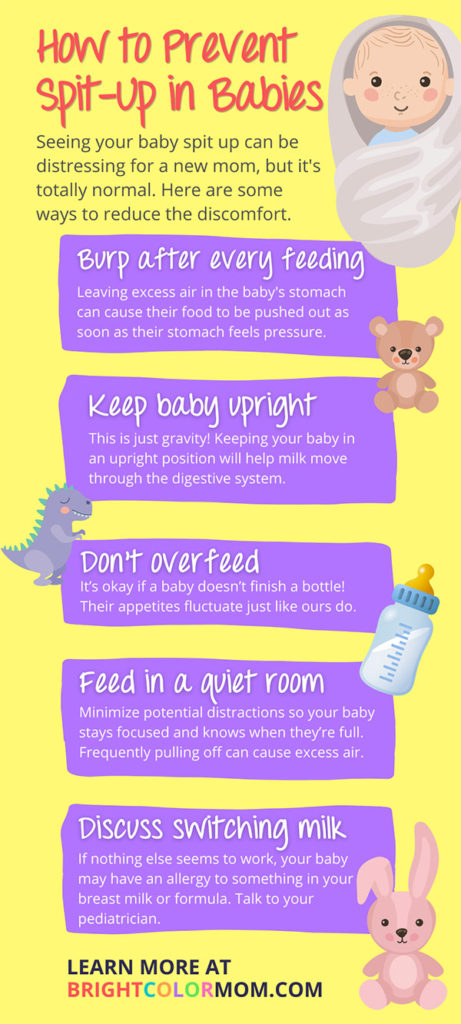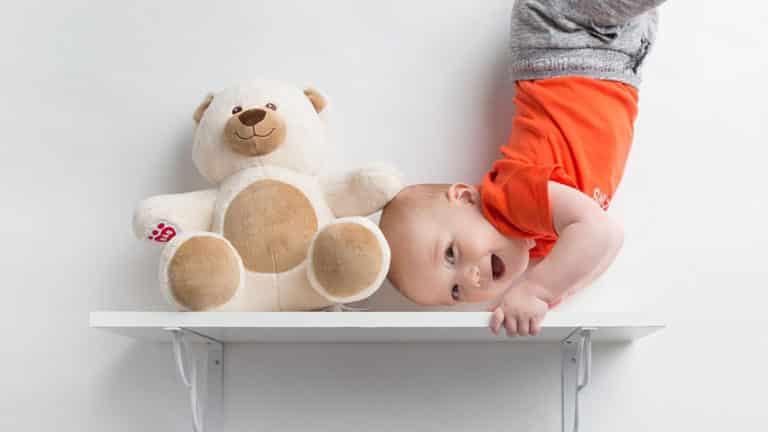The scariest thing that ever happened in my first year of motherhood was when I saw milk coming out of my newborn’s nose. Over and over! Each time she’d stop breathing for a few seconds, and it sent me into a panic. Now, I understand it looks scarier than it is, and I want to ease the minds of other moms going through this for the first time. I’m going to tell you exactly what to do when milk comes out of baby’s nose.
I’ve gotten answers to specific questions from Dr. Leann Poston, MD and Professor May Ng, PhD so that you can feel safe trusting the information provided in this article as well.
This article provides general information and discussions about health and related subjects. The information and other content provided in this article, or any linked materials, are not intended and should not be construed as medical advice, nor is the information a substitute for specific professional medical expertise or treatment.
If you have a medical concern, consult your healthcare provider or seek other professional medical treatment. Never disregard professional medical advice or delay seeking it because of something you’ve read on this website or in any linked materials. If you think you may have a medical emergency, call your doctor or emergency services immediately.
When to Be Concerned About Baby Spit-Up
You probably already know that spit-up is a totally normal part of being a baby. The only times you should really be concerned about it is when the baby:
- Can’t catch their breath
- Is spitting up something other than their food
- Stops gaining weight
Is milk coming through a baby’s nose normal?
Believe it or not, milk running out of the nose is fairly common in newborns. It’s called nasal regurgitation. “The nose and mouth are connected at the throat so it is very normal for babies to have milk come out of both when they spit up or vomit,” assures Dr. Poston.
Nasal regurgitation can look particularly alarming in small infants when a lot of breast milk or formula comes back up quickly. You might notice your baby gasping for air and milk coming out of their nose due to its forcefulness. This type of spit-up is often mistaken for vomiting at first, though nasal regurgitation can also happen during vomiting. We’ll discuss how to tell the difference between the two in a little bit.
Can a baby die from vomiting through the nose?
While vomiting is certainly unpleasant for an infant, the act in and of itself will not seriously harm or kill a baby. The only way throwing up milk through the nose could seriously injure a baby is if they go for prolonged periods without being able to breathe in oxygen. Even though each instance may feel like an eternity, vomiting through the mouth or nose usually only lasts a second or two.
Why Milk Comes Out of a Baby’s Nose
In the simplest terms, babies take in a lot of fluid (breast milk or formula) relative to their size. It’s easy for them to take in too much, and they can quite literally overflow! There are many specific causes of spit-up in babies. Dr. Poston mentions:
“Swallowing excess air.”
Hungry infants get greedy! Drinking too quickly or beginning to swallow before they have an airtight latch can lead to taking in a lot of air. Their little stomachs don’t take kindly to it and can abruptly force it back out, taking fluids with it.
“Being distracted.”
This can become a problem in older infants who get too complacent in the habit of feeding. They may wait too long to swallow between sucks, causing them to choke on an overabundance of milk.
“Weak muscles holding the lower esophagus closed.”
Babies are born with a lot of small parts still growing into the right sizes, and the “flap” that helps keep food in the stomach is often not strong enough at birth to do its job. These weak muscles can result in milk coming out of your baby’s nose while sleeping or when nursing while lying down. Gravity no longer aids in holding the milk in their stomach in these positions.
Not surprisingly, there are also other uncontrollable causes of spit-up in babies:
Normal bodily functions.
Infants aren’t as well-aware of incoming bodily acts such as sneezing, coughing, or hiccuping as we are. They can happen right in the middle of eating, causing their food to come back out. As far as causes specific to milk coming out of baby’s nose, there are a few theories available (other than their nasopharynx not automatically closing).
Forceful letdown.
Breastfeeding mothers with an abundant supply may release more milk in the first few sucks faster than the baby can swallow it. Pair this with the fact that the nipple is pointing toward the upper part of the baby’s throat, and you’ve got a recipe for instant nose dribble.
The baby may have a cleft palate.
This is a very rare explanation, but also one of the most common birth defects. A cleft palate means the baby has a hole in the roof of their mouth, making it easy for milk to get into their nasal passages. A submucous cleft palate is the hardest to detect at birth. So if your baby seems to have milk coming out of their nose at every feeding, you should ask your doctor to check for one.
This post may contain affiliate links. If you make a purchase after clicking one, I may receive a small commission at no cost to you.
What Happens When Milk Comes Out of a Baby’s Nose
Your primary concern when your baby spits up through their nose is that they can’t breathe. I know it was my first thought! So are there serious dangers of vomiting through the nose? Someone has probably told you about “dry drowning” and you’re frantic that even though the spit-up has stopped, something bad is still about to happen. Prof. Ng has assertively denied that this is a possibility.
While the inability to breathe is uncomfortable, keep in mind that a few seconds without taking in oxygen does not hurt most people, nor should it hurt your baby. “They may become distressed as babies are essentially nose-breathers, but once the secretion is cleared, it usually does not interfere with breathing,” says Prof. Ng.
You can attempt to clear the milk stuck in your baby’s nose with a nasal aspirator made for babies. Either way, your baby should instinctively breathe through their mouth until their sinuses are clear. Your baby will not suffocate from a stuffy nose.
In rare instances, spit-up may get into the trachea, leading to aspiration and possible pneumonia. “Aspiration is when something enters the airway or lungs by accident… This can cause serious health problems, such as pneumonia. If the baby has difficulty breathing, turns blue, it warrants an urgent 911 call,” stresses Prof. Ng. You may need to put your baby on their side for a moment to stop the flow of milk out of their nose.
If you suspect your baby has inhaled milk while spitting up but they are still breathing and have normal color, you should contact your doctor right away. Symptoms of pneumonia include fever, persistent cough, or difficulty breathing.
Spit-Up vs. Vomit
Prof. Ng illustrates the difference between spit-up and vomit. “Spitting up is a small amount of milk coming out after a feed, but vomiting is generally more forceful, projectile, and plentiful.”
Dr. Poston adds, “While spit-up or the reflux of milk out-the nose and mouth are very common, vomiting, or the forceful expulsion of stomach contents, is not.”
Seeing a newborn baby vomiting milk from the nose is even more shocking because of the force with which it can come out. I will never forget watching milk shoot out of my baby girl’s nose, eyes wide and unable to breathe. The keyword there is “shoot.” Vomit is not like the trickle of milk caused by spit-up.
If your baby is throwing up and milk is coming with it, your baby will almost certainly have it come out of both their mouth and nose. If milk is only coming out of the baby’s nose and not in a spray, it is probably just spit-up. Spit-up is the reverse flow of the milk your baby has consumed. Vomit is caused by muscles contracting in the stomach, forcefully expelling it from the baby’s body.
Causes of Vomiting in Infants
Stomach virus.
Babies can get norovirus or rotavirus just like adults do. These bugs can affect little ones more seriously, though, so if you suspect this to be the cause you should keep a close eye on your child.
Infection or blockage.
These things can cause inflammation of the stomach and intestines. They may also cause bile or even blood to come up. If you notice green, yellow, red, or black fluid in your baby’s vomit, call your doctor immediately.
Motion sickness.
Has anyone ever told you not to toss your baby in the air right after a feeding? There’s a good reason! Baby’s stomachs are particularly sensitive to quick movements, which can lead to vomiting.
Poisoning from chemicals or medications.
If your baby has accidentally ingested dangerous chemicals (like household cleaners), adult medications, or too much of a prescribed infant medicine, they may be vomiting to try and rid their body of poison. Call poison control immediately at (800) 222-1222 if you suspect your baby has been poisoned.
What to Do When Milk Comes Out of Baby’s Nose and Mouth
When your baby spits up through the nose, “wipe it away just as you do when it comes out of the mouth,” instructs Dr. Poston. “Keep your baby in an upright position. Holding a baby upright while they spit up or vomit helps protect their airway.“

Keep some practical advice in mind, as well:
Don’t panic.
Babies often get their emotional cues from their mothers, so staying calm will help your baby do the same.
Comfort your baby.
Change them into clean clothes and speak in soothing tones while doing so. Provide some skin-to-skin contact to help calm a baby in distress.
What to Do If it Happens While Your Baby is Sleeping
If your baby is sleeping when you notice milk coming out of their nose, it might not be necessary to wake them up (though they might on their own anyway). Wipe away the fluids as you normally would and make sure your baby is still breathing without difficulty.
If your baby chokes on the milk flowing out, turn them to their side and stay with them until the milk stops coming out. Never leave a newborn on their side to sleep without supervision. If turning to the side does not prevent choking, you’ll need to pick your baby up and put them upright on your shoulder.
Ways to Prevent Milk from Coming Out of Baby’s Nose
Unfortunately, there is only so much you can do to stop milk from coming out of your baby’s nose. “Since the back of the mouth and the back of the nose are continuous at the throat, parents cannot regulate whether milk comes out the mouth, nose, or both,” explains Dr. Poston.
Prof. Ng does have a few tips for helping prevent spit-up in the first place, though.
“Burp after feeding.”
Leaving excess air in their stomach can cause their food to be pushed out as soon as their stomach feels pressure.
“Keep the baby’s head more upright after feeding.”
This is just gravity! Keeping your baby in an upright position will help milk move through the digestive system.
“Don’t overfeed.”
And yes, it is possible to overfeed an infant. Pay attention to your baby’s cues that they are full, such as repeatedly pulling off the nipple or moving their head side to side as if to say “no.” It’s okay if a baby doesn’t finish a bottle! Their appetites fluctuate just like ours do.
Here are some other tips I’ve learned over the years that help prevent spit-up:
Don’t let your baby get too hungry.
They will eat too fast, which causes them to take in more air, which can force their milk back up. More frequent, smaller feedings may help.
If breastfeeding, hand-express a little first.
If you’ve got full breasts, the initial latch may cause a torrent of milk to shoot into your baby’s mouth. Expressing the initial pressure will help ensure a steady flow from the start.
Experiment with different feeding positions.
Nursing while lying down can be more likely to cause the milk to flow back out of your baby’s nose and mouth. Finding the best position for your baby to get a good latch, as well as to utilize gravity, can help prevent spit-up.
If bottle-feeding, make sure your nipple isn’t too fast.
Nipples have size ratings starting at newborn (0), so make sure you’re not using one bigger than they can handle. You can also get baby bottles specifically designed to prevent colic and reflux – that’s what I did for my daughter!
Try paced feeding to prevent overfeeding.
Offer a pacifier if you believe your baby has eaten enough and is sucking more for comfort.
Feed in a quiet room.
Minimize potential distractions so your baby stays focused and knows when they’re full.
Avoid tight diapers or clothing.
Babies are small, and it doesn’t take much pressure to cause them discomfort. Pull their diaper tabs just tight enough to be secure.
Don’t go straight to tummy time after eating.
This pretty much guarantees your baby will spit up. Even if your baby falls asleep again before you get tummy time in, that’s okay. There will be plenty of days for tummy time after your baby stops spitting up so much.
Put your baby to sleep on their back.
While it may seem counter-intuitive, putting them on their stomach may actually be the reason your baby is spitting up. Stomach sleeping is also dangerous for infants because they may not be able to lift their faces out of puddles of fluid.
Discuss switching formulas with your doctor.
If nothing else seems to work, your baby may have a formula allergy or sensitivity. They make special formulas designed to help prevent spit-up, but you don’t want to switch formulas frequently or without consulting your pediatrician.

When Babies Stop Spitting Up
“They tend to outgrow it after about 18 months or so,” says Dr. Poston, though you may notice considerable improvement around the six-month mark (when babies start sitting up on their own). However, keep in mind that it might get better before it gets worse! It’s common for spit-up to reach a peak around 4 months old.
And remember… even adults regurgitate sometimes! We’re all guilty of eating a little too much of our favorite foods, right?
When to Call a Doctor
Dr. Poston has some specific advice about when to seek help. “Do not intervene as long as your baby is breathing or coughing on their own. If your baby should stop breathing or turn blue, begin CPR and call for help immediately. If the spit-up does not look like milk, with a yellow or green tinge, call your doctor. Call if your baby is spitting up blood, losing weight or not gaining weight, or is excessively fussy.“
Spit-up that looks green, yellow, or red could be a sign of blockage that needs to be addressed. Also, if every single feeding results in your baby choking on milk coming out of their nose (or at all while sleeping), call your doctor immediately. Other things you should bring up to your pediatrician include if your baby:
- Can’t eat or swallow properly (this is a sign of a possible cleft palate).
- Has watery or bloody poop. This is another sign of an intestinal blockage.
- Appears to have a change in personality around the same time their spitting up becomes severe.
- Screams and refuses to continue eating after regurgitating. This is a sign of acid reflux that may require medication to neutralize.
- Still spits up a lot after their first birthday.
- Is projectile vomiting instead of just spitting up.
- If your baby can’t breathe even after the milk appears to be cleared, call an ambulance and begin infant CPR immediately.
Also, Mother’s Intuition is a very real thing. If something just feels wrong, or if your baby appears sick to you, contact your pediatrician and schedule a checkup.
Learn More While You’re here
Becoming a mom comes with a LOT of questions. We’ve got answers to more of them below!









Impressive post with loads of information. Kudos to the writer.
Thanks for the information
This article has really been helpful. Thank you